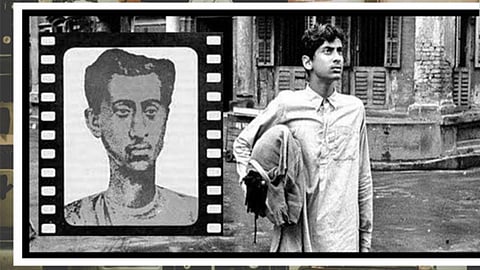
- HOMEGROWN WORLD
- #HGCREATORS
- #HGEXPLORE
- #HGVOICES
- #HGSHOP
- CAREERS
- ABOUT US
- CONTACT US

History is strange and seldom fair. While some people enjoy having their names etched onto the pages of mainstream history, there have been many deserved and distinguished personalities that have not withstood the test of time. In the annals of Indian cinema, certain names have become legendary, and rightly so — Dadasaheb Phalke, Satyajit Ray, and Raj Kapoor, to name a few. Yet, there is one name that remains shrouded in obscurity, lost amidst the passage of time. Hiralal Sen, India's first filmmaker, stands as a forgotten figure, his contributions to the world of cinema consigned to the shadows. Today, we're exploring the life and legacy of a forgotten genius and an influential pioneer during the early days of homegrown cinema.
Born in Bogjuri, now part of Bangladesh, Hiralal Sen's love affair with photography began during his college days in Calcutta. In 1898, his path intersected with the nascent art of cinema when he witnessed a show called The Flower of Persia at the esteemed Star Theatre. Enthralled by this new medium, he embarked on a journey that would forever change the course of Indian filmmaking.
The Lumière brothers' invention of the cinematograph machine in 1895 set the stage for the birth of motion pictures. Inspired by this revolutionary device, Hiralal Sen spent a significant sum — Rs 5,000 — in acquiring a cinematograph machine and projection equipment from England. He also procured the Urban Bioscope from a film projector development company in London. With these tools in hand, Sen ventured into uncharted territory, attempting to merge the worlds of theatre and film.
Together with his brother Motilal, Hiralal Sen established the Royal Bioscope Company in 1898, marking India's first foray into movie production. Initially, they screened films made by English companies, captivating audiences at parties and weddings. However, Sen's passion led him beyond mere exhibition. Collaborating with Amarendra Dutta of Classic Theatre, he captured song and dance sequences from plays, blurring the lines between bioscope and theatre. These early experiments laid the foundation for the art of storytelling through moving images.
Hiralal Sen's pioneering spirit manifested in numerous groundbreaking achievements. In 1903, he accomplished what many consider his most notable feat — he directed Alibaba O Challish Chor, India's first full-length feature film, nearly a decade before Dadasaheb Phalke's renowned Raja Harishchandra. Sen's visionary approach extended beyond storytelling and saw him venture into advertising films; creating India's first-ever product commercials. Notably, he filmed advertisements for Jabakusum hair oil and Edward's anti-malaria drug, showcasing his ability to combine artistry and commerce.
Sen's contributions to Indian cinema also extended beyond just entertainment. In 1904, he documented a public rally opposing Lord Curzon's plan to divide Bengal, creating what is believed to be India's first political documentary. By placing his camera atop the Treasury building, he captured the vastness of the rally and the prominent speakers who shaped the region's destiny. Additionally, when King George V visited India in 1911, Sen triumphed over competition from English cameramen, becoming the first to release Delhi Durbar, a film that provided wider coverage of the historic event.
Despite his remarkable achievements, Hiralal Sen's life took a tragic turn. Financial struggles and a fallout with his brother led to the closure of the Royal Bioscope Company. Sen joined London Bioscope, owned by Kumarshankar Gupta, a former employee of his own company. However, fate dealt him a cruel blow. On October 24, 1917, a fire ravaged the Kolkata godown where Sen had stored all 40 of his films. Devastated, on the verge of insolvency, and battling throat cancer, he passed away just two days later at the age of 51.
Despite his significant contributions, Hiralal Sen's name has faded from our collective memories and ended up buried beneath the sands of time. His works, destroyed by fire, are made up of few remnants. The absence of a proper biography and limited documentation also further contributed to his relative anonymity but his absence from history's pages is a glaring omission, and an injustice to a visionary who played a pivotal role in shaping Indian cinema.
Some sense of revival attempt or justice was meted out to Hiralal Sen when Bengali director, Arun Roy made a biopic on him in the year 2018. The movie begins by capturing his childhood, goes on to depict Hiralal’s rapid rise in making films, and ends with his unfortunate turn of luck and subsequent fall from grace. The honest intentions of director Arun Roy to remind the audience of his legacy shines through and succeeds in establishing a connection with the viewers, as we feel the agony of someone erased by history. It also narrates how the expansive entertainment industry of the day started out as a result to the eagerness and vision of a select few people and connects the bridge between theatres and movies. You can watch the trailer of the biopic below.
Hiralal Sen's life and legacy are a testament to the indomitable spirit of a filmmaker whose vision defied limitations. His achievements as India's first filmmaker, advertising pioneer, and documentarian marked a transformative era in Indian cinema. The tragic demise of his films and subsequent erasure by history have robbed him of the recognition he so rightly deserves. It is therefore incumbent upon us, as lovers of cinema, to keep his story alive and restore Hiralal Sen to his rightful place as an influential figure in the pantheon of Indian filmmaking and photography while recognizing him as a visionary who paved the way for generations to come.
